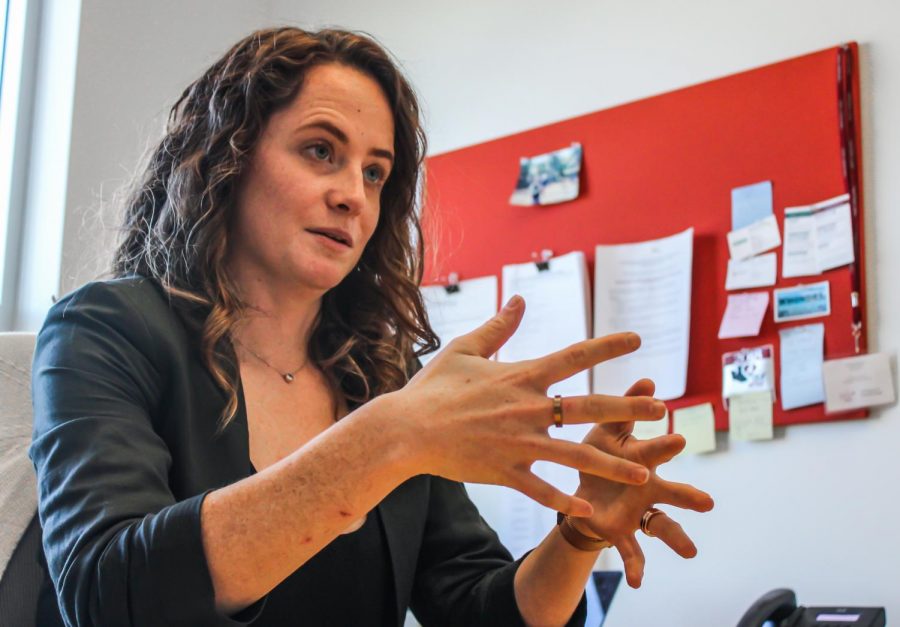Antibiotic resistance genes cause environmental problems
Harmful genes get through wastewater treatment centers
Courtney Gardner, assistant professor in the department of civil and environmental engineering, talks about how antibiotic resistance is a problem on Oct. 25.
November 12, 2019
A study found that antibiotic resistance genes are not being treated fully in wastewater treatment plants, which could become an environmental problem.
Those genes can be released into the environment in many ways. This includes human ingestion and plant decomposition, said Courtney Gardner, assistant professor in the WSU department of civil and environmental engineering.
The organic matter that comes out of the wastewater treatment process is used in fertilizers. Antibiotic resistance genes could end up back in the environment, Gardner said.
A wastewater treatment plant is a facility that treats sewage and converts it into clean water that can be released into surface water, said Claudia Gunsch, associate professor in the department of civil and environmental engineering at Duke University.
The researchers wanted to find out if antibiotic-resistant genes are being released from genetically modified crops and increasing antibiotic resistance in the environment, Gardner said.
Many genetically modified crops have antibiotic resistance genes. In the 1980s, the simplest way for genetic engineers to determine if they had genetically modified a crop was to add antibiotic resistance genes, she said.
The solid parts found in water end up in a specific tank called a digester tank during the wastewater treatment process, she said. The solids are exposed to heat where microbes, such as bacteria, will break them down.
In a wastewater treatment plant, the researchers added extracellular antibiotic resistance genes from genetically modified crops to the solids in a digester tank, Gardner said.
Over 30 days, which is the typical length of time that the solids are being treated in digester tanks in the U.S., the number of extracellular antibiotic resistance genes significantly decreased, she said.
“That does suggest to us that there is some treatment of these genes,” Gardner said.
The researchers left the solids in the digester tank for a total of 60 days, she said.
Gunsch said that wastewater treatment plants in Europe typically keep the solids in a digester tank for longer than 30 days, unlike the U.S.
From 30 to 60 days, the researchers saw an increase in the number of antibiotic resistance genes in cells, Gardner said.
Gunsch said the genes were found in bacteria cells.
“If they’re present in high enough concentrations, these antibiotic resistance genes that are taken from genetically modified crops can be taken up by bacteria even in a really hostile environment like a digester sludge tank,” Gardner said.
She said researchers think the antibiotic resistance genes bound to the organic matter in the solids in the digester tank, which allowed the genes to be protected from heat degradation.
Once those genes are bound, there is not much that can be done to remove the genes from the solids; it would be necessary to unbind the genes, she said. Genes that were bound to the solids could end up in fertilizers and in the environment.
There are increased rates in the spread of environmental antibiotic resistance, Gardner said.
WSU Regents professor Doug Call, who was not involved in the research, said antibiotics are widely used. People receiving chemotherapy need antibiotics because their immune systems have shut down. People take antibiotics during labor to prevent infections.
Many patients receive antibiotics in hospitals. It is routine, Call said.
Gardner said antibiotic resistance has significantly increased in the last several decades.
“It’s reaching a critical point now where a lot of our first and even sometimes our last resort antibiotics aren’t effective,” she said.
















Tod Merley • Nov 13, 2019 at 5:42 pm
Things do happen when bacteria and other gene active microbia get together! And human sewage does seem to be a place very active. Check out the resurgence of polo 2 in Nigeria.
Antibiotics, in my opinion, are a sort of “flash in the pan” technology. The bugs will always adapt and share how they adapt with others. This makes the technology intrinsically unsustainable.
The truth is that we all need a healthy biome including our microbiome and virome. And all articles I have read tell that great diversity leads to great health. But antibiotics try to “kill them all” and in doing so decrease the diversity of microbes we have and along with it the genetic diversity we need to adapt well and so not get sick.
Fortunately microbes of all sorts are very smart. The quickly adapt. And so antibiotics simply are not working for us anymore. We really do need to move on!